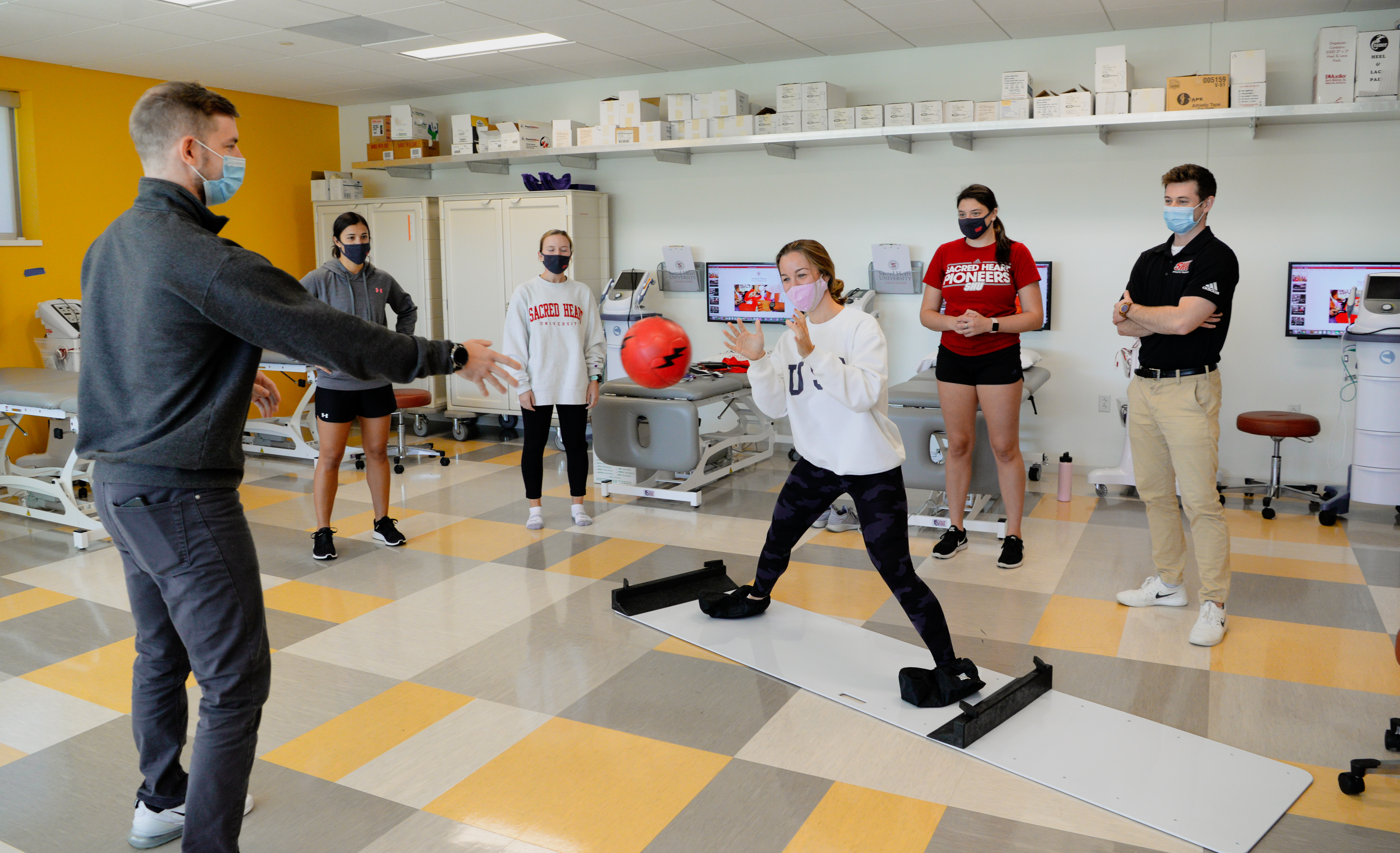So you’re interested in making a difference with an advanced degree in the area of human movement science...this is exciting news! Soon, you’ll be working to effect positive change in people’s lives through clinical practice. But not only that––you’ll also be entering a dynamic field that is projected to grow much faster than average (23% for athletic trainers and 13% for exercise physiologists in the next 10 years, respectively), according to the Bureau of Labor Statistics.
But before you get started, you might be wondering which path is right for you, and what the particular differences are between the two careers.
Two faculty experts in Sacred Heart University’s College of Health Professions––program director of athletic training Stephanie "Stevie" Clines, PhD, LAT, ATC and assistant professor of exercise science Christopher Taber, PhD––took the time to share what you need to know in their respective areas as you consider your next step.
What’s the difference between Athletic Training anD
Exercise & Sport Science?
Athletic Training vs. Exercise & Sport Science: An Overview
Athletic trainers are certified medical professionals who can diagnose, treat and provide rehabilitation for the physically active population. Strength coaches and sport scientists help to develop the physical, technical and mental aspects of athletes through training and performance monitoring.
More about athletic training
Athletic Trainers (ATs) are highly skilled allied healthcare professionals who specialize in the assessment, prevention, treatment and rehabilitation of emergent and non-emergent injuries and medical conditions. ATs work under the direction of or in collaboration with physicians to provide patient-centered care to the unique subpopulation of physically active individuals.
Athletic training is one of the fastest growing healthcare professions in the U.S. The demand for ATs is rising due to a greater recognition of the effects of sport- and activity-related injuries, as well as the need for better injury prevention strategies. Additionally, individuals are remaining more active throughout the life span, requiring expertise and care from health care providers such as athletic trainers.
Academics in Athletic Training
The education requirements of an athletic trainer follow a medical model, where students gain both didactic and clinical experience as part of their training. Athletic trainers must graduate from an accredited athletic training program* and pass a national Board of Certification examination. Like other health care professionals, ATs are licensed or regulated as health care providers in 48 states and the District of Columbia.
*Effective fall 2022, all professional-level athletic training programs must result in the granting of a master’s degree.
More about exercise & sport science
Sport science is an emerging field and likely to grow exponentially in the next years. It’s an exciting time to get involved in the field. The exercise & sport science program has a great relationship with SHU athletics and this gives students the chance to work with athletes and improve their performance while gaining experience.
What areas of study are available?
Athletic Training
Athletic trainers are educated and trained in five major practices domains:
- Injury/illness prevention and wellness protection
- Clinical evaluation and diagnosis
- Immediate and emergency care
- Treatment and rehabilitation
- Organizational and professional health and well-being
Exercise & Sport Science
Strength coaches and sport scientists may specialize in the following areas:
- Anatomy and physiology
- Biomechanics
- Bioenergetics
- Sport technology
- Athlete testing and monitoring
- Data collection, management and analysis
- Coaching methods
What types of careers can I pursue with a degree in athletic training or exercise & sport science?
Careers with a Master’s in Athletic Training
Graduates with an MS in athletic training are employed in the following settings:
- Athletics (professional, collegiate, secondary schools, youth sports)
- Performing arts (i.e. Cirque du Soleil, Manhattan Ballet, Rockettes)
- Military
- Industrial settings (ex: Boeing, Amazon, Frito-Lay)
- Public safety (fire departments, police)
- Orthopedic practices
- Hospitals
- Rehabilitation clinics
- Academic and research institutions
Careers with Master’s in Exercise & Sport Science
In addition to being eligible to pursue their doctoral studies, graduates with an MS in exercise & sport science can be employed in the following areas:
- Strength and conditioning coaching
- Data science
- Sport science
- Private strength coaching
- High school strength coaching
- Data analysis
- Sport coaching
Graduate Students in Athletic Training vs. Exercise & Sport Science
Who should pursue a master’s in athletic training?
- Students interested in a career in health care, particularly working with various populations of physically active individuals ranging from children to older adults
- Individuals interested in anatomy, orthopedics, sports injuries or emergency and acute care
- Individuals who enjoy working as a team and collaborating with other health and wellness professionals
Who should pursue a master’s in exercise & sport science?
- Students who are interested in sports and improving human performance
- Individuals who want to blend the scientific method with the training of athletes
- Students who want to be involved in the development of athletes during their time in the program and gain practical experience




